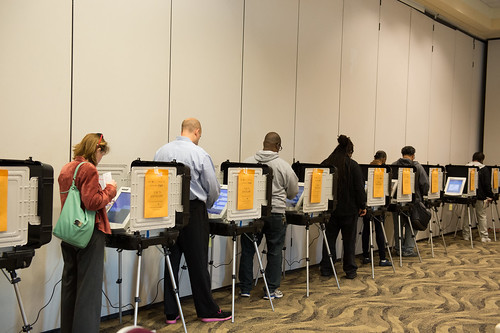The Republican Party's post 2020 state-by-state assault on voting rights has begun with the demand that all mailed-in paper ballots include photo ID.
The Jim Crow racism is beyond obvious. Instead of having to guess, mailed-in photo ID lets election officials quickly identify which ballots came from citizens of color " and then pitch them on the spot. By banning student IDs, they can also eliminate ballots coming from college campuses.
Thus the Nixon-Trump/Atwater-Rove-Bannon Republicans have picked up the KKK burning cross straight from hands of the Jim Crow Democrats.
They're flooding at least 28 state legislatures with more than a hundred laws meant to undermine American democracy. 2020 taught them that, in Trump's own words, if people of youth and color could cast ballots and have them reliably counted, "you'd never have another Republican elected again."
The 2020 election was "stolen" in Trump's eyes, not merely due to his false allegations about voting machines. What REALLY mattered was that voters of color - black, Hispanic, Asian-American, indigenous - were able to cast paper ballots and have them counted. They came in heavily against Trump, and are likely to escalate against his ilk for years to come.
Voters under 29 in 2020 voted at more than 60% to dump The Donald. Had the electorate been only Millennials and their younger Zoomer cohorts, Trump would have lost by more than 400 electoral votes, including in Texas, Florida, both Carolinas, Iowa and more.
So no Republican will ever consider an election with fair universal access to hand-marked, Vote by Mail, reliably scanned and counted paper ballots to be anything but "stolen."
Indeed, the whole history of the modern Republican Party (like the race-based Democrats before) has been built on voter suppression. In Georgia and elsewhere, they are pushing bills to:
- massively strip and restrict the right to register to vote and have those registrations protected
- vastly expand the ability of states to purge voter rolls
- ban sending out paper ballots to all registered voters
- ban sending a paper ballot to any absentee voter who does not have a certified medical excuse
- demand photo ID from all voters who show up at the polls
- demand photo ID to be included in any mailed-in ballot application
- demand photo ID to be included in any mailed-in ballot
- demand ballots be witnessed and stamped by one or more notary public
- eliminate acceptance of student ID (as in Texas, gun licenses will still be accepted)
- ban drop boxes
- ban allowing any voter, including those with special needs, from designating anyone to carry their ballot into an election board or voting center
- ban election day registration
- ban prohibitions against caging, which allows party operatives to defraud voters of their ballot
- ban early voting
- tighten time tables for receiving mailed-in ballots
- make it easier for challengers to demand elimination of received ballots
- tighten signature verification, making it easier to arbitrarily pitch ballots
- eliminate precincts primarily in non-white, lower-income areas, and at college campuses
- impose electronic ballot marking devices at voting stations where they can break down, causing long lines
- impose electronic ballot marking devices producing paper ballots that hinge on bar codes illegible to any voter
- use ballot marking and scanning devices with proprietary source code that cannot be monitored by the public
- impose financial and other restrictions effectively banning any third party from gaining an access line on a ballot
- allow local election officials to eliminate saved digital ballot images even though saving them adds no cost to administering an election while vastly enhancing the ease and accuracy of doing recounts
- restrict public audits and recounts of contested elections
- enshrine gerrymandering to guarantee minority Republican rule in swing-state legislatures and the US House of Representatives.
This list goes on.
Many of these bills could be overruled if the massive, extremely complex HR-1 Bill (and its Senate counterpart) would pass the Congress. But with the filibuster still in tact, the odds are dicey.
HR-1 also has its imperfections, among them clauses that could doom nearly all third-parties.
Some 400 pro-democracy bills have also been proposed. But in the key swing states of Wisconsin, Indiana, Kentucky, Ohio, Pennsylvania, New Hampshire, the Carolinas, Georgia, Florida, Texas, Arizona and others, gerrymandered GOP legislatures are poised to beat them back.
The future of any remnant of US democracy might thus depend on the ability of grassroots activists in these key states to somehow override these corrupt legislatures.
It will also ride on grassroots uprisings for state constitutional amendments and other legal means to end gerrymandering altogether, and to establish fair election practices that can't be trashed by Republicans who so deeply fear actual democracy. Such victories have been won in places like Michigan, Iowa, California and elsewhere.
Winning DC statehood, burying the Electoral College and banning money from electoral politics are also on the agenda.
(Note: You can view every article as one long page if you sign up as an Advocate Member, or higher).






